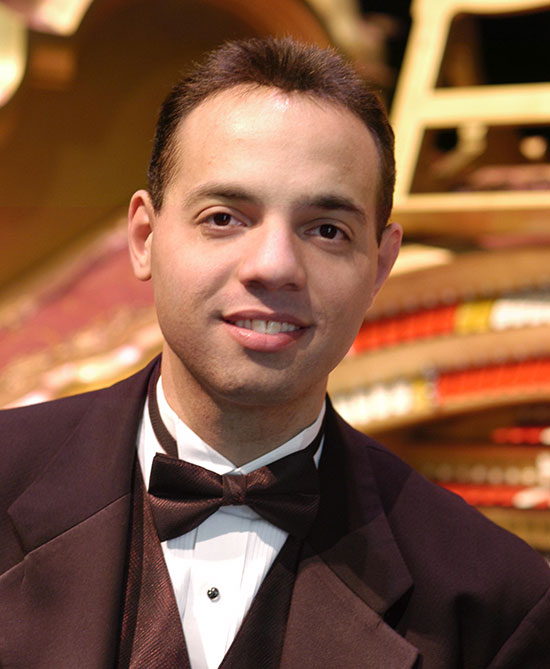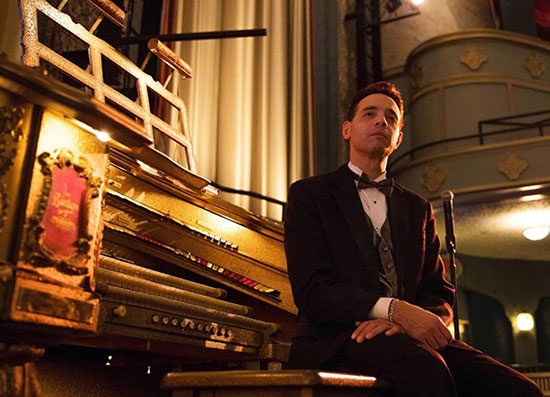
At age 13, Robert Jelani Eddington, progeny of a musical family, won the prestigious American Theatre Organ Society’s Young Theatre Organist Competition.
Tell us about your background.
I grew up in Muncie, Ind., in a musical family. My mother was a public school elementary music teacher, and my grandmother was a professional piano teacher for many years. For as far back as I can remember, music has always been present in my life in some way.
Your grandmother started you on piano at age 4. Were you a good student then?
I hope I was a good student, but I’m sure she could have told you a few stories! My grandmother was very much an “old-school” piano teacher, meaning that all of her students had to learn to play correctly with good fingering, good posture, and good technique. She was firm, but kind, and I didn’t get any special dispensation from the rules as her grandson. For that, I will be eternally grateful.
Tell us about the first time you heard an organ.
When I was 8 years old, I visited a restaurant in Indianapolis called the Paramount Music Palace. The restaurant was a pizza parlor at the center of which was a large theatre pipe organ that would entertain the guests while they ate. Unlike most pipe organs, this particular instrument was installed in a way that you could see many of the organ’s working parts. I was fascinated that one person could control all of the facets and sounds of the instrument, and I decided in that moment that I wanted to learn to play one.
Readers in the Milwaukee area may be familiar with the Greenfield restaurant Organ Piper Pizza, which is very similar to the restaurant that piqued my interest so many years ago.
What is a theatre organ, and what makes it unique?
I specialize in theatre organ performance. The theatre organ is a type of pipe organ that was developed in the 1910s and 1920s for installation in theatres large and small throughout the United States and abroad. The instruments were initially designed to accompany the silent films of the era. Previously, film accompaniment had been the province of pianists and pit orchestras. Theatre organs had to be able to replicate the diverse sounds of a symphony orchestra (violins, brass, woodwinds), tuned percussion (xylophone, glockenspiel, chimes, celesta), as well as other traps and special effects (drums, cymbals, police sirens, bird whistles, and so on).
In about 1929, so-called talking pictures made their debut, and the initial purpose of theatre organs came to an abrupt end. However, over time the theatre organ transformed into a solo performance instrument in its own right. Ninety years later, there are organists and enthusiasts throughout the world dedicated to preserving this art form through public concerts, silent film performances, recordings, and teaching.
Quick Facts
Years in practice: 19 total, nine in Wisconsin
Undergraduate: Indiana University, 1996
Law school: Yale Law School, 1999
Other states licensed: New York
Favorite quote: “Music is enough for a lifetime, but a lifetime is not enough for music.” – Sergei Rachmaninoff
Hobbies: Travel, languages
Favorite composers: Sergei Rachmaninoff, Leroy Anderson
Contact: rje@eddingtonlawoffice.com
What do you like best about playing an organ for silent film? What are the challenges?
What I like about playing for a film is the ability to bring an otherwise silent film to life through music. But that task comes with enormous responsibility, as a clumsy accompaniment can ruin a great film. Conversely, an effective accompaniment can engage the audience and cue appropriate emotional responses with just a few notes of the keyboard. Ideally, if the accompanist does a good job, the public is so drawn into the film that they no longer focus on the organist.
By contrast, in a concert setting, the roles are somewhat reversed. The concert artist must captivate the audience personally by drawing the public into the musical performance itself.
Which organ is your favorite to perform on and why?
There are so many wonderful instruments that it’s hard to pick a favorite. One of my favorite instruments is in a private collection in Barrington, Ill. (just outside Chicago), in the home of Jasper and Marian Sanfilippo. It is also the instrument on which I recorded my “viral” YouTube video (more on that later). The instrument is one of the largest theatre organs in the world, has an incredible dynamic range, and is capable of a broad range of music from classical and orchestral, to Broadway and jazz, music of the Silver Screen, and even to today’s top 40.
What made you decide to pursue law?
When I was young, I used to watch episodes of Perry Mason on TV. I loved watching the courtroom dramas unfold in every episode. As I got older, I realized there was a lot more to it than just Perry Mason. But I was drawn to the law as a way to advocate for the interests of others.

Robert Jelani Eddington frequently performs at Madison’s Overture Center as a part of the Duck Soup Cinema Series. His next performances will be in October and November.
You practiced as a litigation attorney in New York City for several years. What brought you to Wisconsin?
I practiced in a large law firm in New York City immediately following my graduation from law school. At that time, I worked mostly in copyright and trademark litigation and enjoyed my time in that practice. By about 2003, however, I was ready to make a change. I decided that I would switch gears and spend some time exclusively focused on music performance. From about 2003 to 2009 I was a full-time concert and recording artist, traveling internationally performing in many interesting places. I decided to come to Wisconsin because I had good friends and strong musical connections in the area.
You speak English, French, Spanish, Russian, and German. How is it you’ve learned so many languages?
I have always loved languages and suspect that there is some connection between having an “ear” for music and an “ear” for language. I have always seen language as the most effective way to understand another culture. When you can speak to a person in their native language, you understand their culture at a much more personal level. In addition, knowledge of these languages has helped immeasurably for international travel for music (and of course for vacations!)
How does being a performing musician help you as a lawyer? How does being a lawyer help you as a musician?
It’s definitely a symbiotic relationship. Achieving proficiency with any musical instrument requires careful study and dedication, but it also promotes creativity. Dedication and creativity are important skills for practicing law. Conversely, the intellectual rigor of being an attorney has helped me to stay focused on my musical endeavors. And, of course, it also helps to be able to review your own contracts!
You run both a music and entertainment business and a law firm – how well do they mesh?
In addition to the concert and film performances, I teach several private students. I also compose (primarily in conjunction with the silent film work). It is sometimes a challenge to maintain my musical career simultaneously with my law practice. At the risk of over-simplification, the law practice is typically my “Monday through Friday” work, whereas most musical performances occur on weekends.
What areas of law do you practice?
I was drawn to my current practice areas of bankruptcy law and estate planning as a way of helping clients with financial matters – either by helping clients navigate financial hardships through bankruptcy or by helping to preserve clients’ assets for their heirs through estate planning. The business and entertainment practice has grown out of my work in the music industry as an organist.
You have a YouTube video that has more than 3 million views. How did that come about?
That was a bit of an accident. I had recorded the theme to the movie Star Wars – both because I have always loved that music, and because it effectively shows off the orchestral capabilities of the theatre organ. The video sat online for the better part of a year with only modest interest (a few thousand views). I’m not quite sure how it happened, but one day I had friends calling me to tell me they had seen the video on CNN.com, the Huffington Post, and other media outlets. It was extremely humbling to say the least, but I was happy to be able to share the music of the instrument with a wider audience.
When are your next performances?
Most of my performances are outside Wisconsin, but I perform frequently at the Overture Center in Madison as part of the Duck Soup Cinema series. Duck Soup Cinema presents classic silent films with live organ accompaniment several times per year, and I will be performing as part of that series on Oct. 19, 2019, at 2 p.m. and 7 p.m. (Tillie’s Punctured Romance featuring Charlie Chaplin) and Nov. 14, 2019, at 7 p.m. (Hypocrites featuring Lois Weber).
